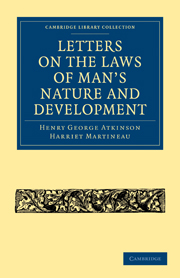Book contents
- Frontmatter
- Preface
- Mottoes
- Contents
- Letter. 1 Inquiry for a Basis
- Letter. 2 Proposal of a Basis
- Letter. 3 Preparation of the Ground
- Letter. 4 What is the Brain?
- Letter. 5 Inquiry about its Structure
- Letter. 6 Early days of Phrenology
- Letter. 7 Inquiry for New Discoveries
- Letter. 8 Methods of New Discovery. Organic Arrangement of the Brain
- Letter. 9 Illustrative Cases
- Letter. 10 Organic Arrangement of the Cerebrum
- Letter. 11 Dr. Howe's Report on Idiocy
- Letter. 12 The Senses and Nervous System
- Letter. 13 Illustrative Comment
- Letter. 14 Facts about the Senses under various conditions
- Letter. 15 Raising questions
- Letter. 16 Bacon, on Matter and Causation. Inferences and Dreams. Association of Ideas
- Letter. 17 Nothing
- Letter. 18 Knowledge and Notions. Results of each
- Letter. 19 Release from Notions. Entrance upon Knowledge
- Letter. 20 Natural History of Superstition
- Letter. 21 Theology and Science
- Letter. 22 Central Law and Pervasive Unity. Light. Sense of Identity. Ghost-seeing. Unrevealed Human Relations
- Letter. 23 Position and Privilege of Truth-seekers
- Letter. 24 Position and Privilege of Truth-speakers
- Appendix
Letter. 16 - Bacon, on Matter and Causation. Inferences and Dreams. Association of Ideas
Published online by Cambridge University Press: 29 August 2010
- Frontmatter
- Preface
- Mottoes
- Contents
- Letter. 1 Inquiry for a Basis
- Letter. 2 Proposal of a Basis
- Letter. 3 Preparation of the Ground
- Letter. 4 What is the Brain?
- Letter. 5 Inquiry about its Structure
- Letter. 6 Early days of Phrenology
- Letter. 7 Inquiry for New Discoveries
- Letter. 8 Methods of New Discovery. Organic Arrangement of the Brain
- Letter. 9 Illustrative Cases
- Letter. 10 Organic Arrangement of the Cerebrum
- Letter. 11 Dr. Howe's Report on Idiocy
- Letter. 12 The Senses and Nervous System
- Letter. 13 Illustrative Comment
- Letter. 14 Facts about the Senses under various conditions
- Letter. 15 Raising questions
- Letter. 16 Bacon, on Matter and Causation. Inferences and Dreams. Association of Ideas
- Letter. 17 Nothing
- Letter. 18 Knowledge and Notions. Results of each
- Letter. 19 Release from Notions. Entrance upon Knowledge
- Letter. 20 Natural History of Superstition
- Letter. 21 Theology and Science
- Letter. 22 Central Law and Pervasive Unity. Light. Sense of Identity. Ghost-seeing. Unrevealed Human Relations
- Letter. 23 Position and Privilege of Truth-seekers
- Letter. 24 Position and Privilege of Truth-speakers
- Appendix
Summary
H. G. A. to H. M.
I will endeavour to reply to this last letter of yours, and the difficult questions you propose, as well as my poor thoughts will aid me. With regard to the blind lady's case, I will try to obtain for you more precise details. The matter has opened an interesting train of reflections as to the possibility of such an experience, and to the nature of sight. It will lead us to consider the distinction between the first—the immediate sense impression of objects, and the after or image impression,—the paintings or shadowed drawings in the mind when the sense is closed. We shall consider, likewise, the circumstances under which these images are projected, as it were, to appear like the real or first impressions, and shall also have to consider whether there be any distinction between our ordinary sense impressions and the clairvoyant impressions, and the different characters of those clairvoyant recognitions; and, again, between the mere dream and true vision, and what is the distinction between the sense the clairvoyant has, in its clearest state, of appearances existing at the time, and its picture of what has not yet occurred (that which we term pre-vision), and whether these clairvoyant recognitions, in either case, occur independently of the perceptive organs which we consider necessary to ordinary sight. I have not advanced far enough at present to give you these requisite definitions; but it is something attained, perhaps, to be aware of the distinctions fundamental to the inquiry.
- Type
- Chapter
- Information
- Letters on the Laws of Man's Nature and Development , pp. 165 - 200Publisher: Cambridge University PressPrint publication year: 2009First published in: 1851



